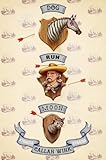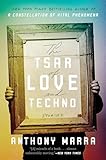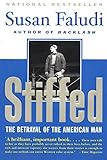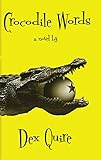 Eighty-eight books on my TBR pile. Thirty-seven on the TBR reserve squad. And beyond Jaromír Navratil’s engrossing Prague Spring 1968, I can’t rightly remember much else of what’s stuffed into the extra carry-on I brought along on my last trip into English-speaking territory, specifically for the purpose of bringing it back filled with books. Still there, safe in the bag, in the same corner I dropped them, having unlocked my flat and walked into a life instantly too full. I don’t know how you make your personal value judgments, but I am not morally prepared to lump a suitcaseful of half-recalled books into my aggregate just yet.
Eighty-eight books on my TBR pile. Thirty-seven on the TBR reserve squad. And beyond Jaromír Navratil’s engrossing Prague Spring 1968, I can’t rightly remember much else of what’s stuffed into the extra carry-on I brought along on my last trip into English-speaking territory, specifically for the purpose of bringing it back filled with books. Still there, safe in the bag, in the same corner I dropped them, having unlocked my flat and walked into a life instantly too full. I don’t know how you make your personal value judgments, but I am not morally prepared to lump a suitcaseful of half-recalled books into my aggregate just yet.
Why do we do this? I managed to put away about 120 titles this year, some of those twice, yet, it wasn’t enough. I worked as a priest years back, but quit. When I took off the dress I also sold my entire library. Two thousand five hundred books, conservatively. I kept about a half dozen, one of which was in English. Yet somehow, given sufficient time, they’ve found their way back. At first, just a trickle — a title here a title there. But then, in some twisted literary analogue of punctuated equilibrium, I now own more than I did then. Stacked and shelved, their covers shinier, their authors confirmable, and in most cases, their copyrights or attestations more recent by 100 human generations, give or take a millennium. But these new books and their silent scream for attention don’t fool me; they’re still bent on the mischief they’ve been up to since Gilgamesh.
I have a theory about all the reading and the writing, and it arises from simply having been blessed with the chance to slow down, to look around, and to talk to the people whose lives meld with my own. Reading is more than just our drug of choice. Writing well is more than just whistling louder past the boneyard now that our gullibility has been largely defrocked. We read and write for largely the same principal reason the ancients did: because, good Lord, we’re a damn mess. If 2016 hasn’t convinced you, I’m not sure what it will take.
I look east and then south, and through a day across the sea, and then back to my homeland where finally my glance comes to rest on The Donald, and I conclude that there are far darker shadows in the world than those cast by my unread piles of books. There are far bloodier and more intransigent problems to be wrestled with than my inability to carve out the time for Karl Ove Knausgård. Yet, there’s a kind of solace that comes with the certainty that the books won’t stop and that the pile will never shrink: it’s the assurance that I’m not alone. Not alone in my wariness of the categorical, the naively empirical, and — this most of all — the terrifyingly attractive and endemic lack of imagination that eventually infects all modes of human endeavor, as well as its ugly step-sister — the urge to repress that imagination in others. So, I keep reading.
I loved every book I read this year, even those I hated, if for nothing else than for the conscious engagement it took for them to be written. The Old Book asserts that Ἐν ἀρχῇ ἦν ὁ Λόγος — in the beginning was the word. It’s never been more true than at this moment: ‘Til the mountains fall into the heart of the sea, we’re here for the books.
What follows are books I read in 2016 but have read before and/or will read again. That is all.
 Dog Run Moon by Callan Wink
Dog Run Moon by Callan Wink
I have lived for a while now in a big city, but come from much the sort of places Callan Wink documents in this debut collection of short stories: fly-over country, peopled with the unwashed, the insignificant, and bundles of the deplorable. Yet these lives are so beautifully observed, their piety so fragile, and their shared dilemma so unforced that it would be indecent to look away, not to care. My preference has — probably always — been for stories about the little people, and without romanticizing things beyond recognition, the broken folks Wink has imagined into existence here tug hard at the part of me that would not struggle in the least moving somewhere where the population density numbers go into free fall. To see if it would help me figure out some things: where love went wrong, where I fit, or where I might find again what was lost. Stories of substance told by a gorgeous stylist whose young enough to still give noogies to.
 Dark Lies the Island by Kevin Barry
Dark Lies the Island by Kevin Barry
I have this bad habit of falling for every Irish writer I read and Kevin Barry is no exception. At the risk of lapsing into cultural stereotype, here’s why: perhaps it’s because the Irish don’t seem to possess the whine gene that infects this age. Goes double for their writers. Stepped on, starved, reviled, invaded, and subsumed, they just keep showing up, keep astounding us with the fact that grace and brutality can exist in such constant and fruitful juxtaposition. Life is an absurd joke and they are the punchline, at which nobody laughs harder than they themselves.
In this collection of short stories, Barry shows an incredible knack for making what ought to be unappealing so utterly appealing. His writing is inhabited by the anti-Facebook crowd — the uncoolest, most unenviable lives you will ever encounter. Lives that demonstrate that in the final accounting, all that ever really remains are faith, hope, and love. But faith poised to topple, hope with a leak at the seam, and love as bent as it can be and still be called love. Darkly comic and just damn dark, as filled with the sinister as they are with succor, this is writing I envy. About halfway in you’ll find “Ernestine and Kit,” likely a modern masterpiece.
 The Tsar of Love and Techno by Anthony Marra
The Tsar of Love and Techno by Anthony Marra
When I first moved to the post-Soviet world, I was given this piece of advice: if you want to survive here, get used to thinking counterintuitively. That’s pretty much right. And that’s pretty much what Anthony Marra gets right in these nine interconnected stories of life “in Russia” past, present, and future. The greatest consistency of the place is its inconsistency: pragmatism meshing with fatal impracticality; ancient wisdom smothered in brutal ignorance; and Sergei Rachmaninoff composing the Divine Liturgy while across the street Vladimir Lenin and Leon Trotsky are bumping heads and planning to burn the place down. The beauty in the ruins.
Marra embraces the paradox and the result is a set of lives vividly rendered by a writer with a flawless eye for the spare detail that evades all genre writing about Russia. The hard lives he fashions engender an uncommon empathy for a place that can be a challenge to love, and it elevates these stories from lyrical curiosities to the realm of literary fiction that would set its hand to some worthy puzzles. Free will versus determinism, and the thought that surviving in the present just might be impossible if you’re unwilling to survive the past. And that’s just for starters. What? You were expecting a “Russian” book that wouldn’t be philosophical?
 Stiffed: The Betrayal of the American Man by Susan Faludi
Stiffed: The Betrayal of the American Man by Susan Faludi
First of all, love Ms. Faludi for her brain, her admirable intellectual rigor. Next up, love her for her practicality. You may disagree with her analysis, you may not, however, brush it aside as aloof, obscurantist, or the work of someone indifferent to society and its welfare. Finally, love her for her clarity. Given the shitstorm of an election cycle we just went through, clarity is at a premium. As the author demonstrates in the lives of the men she chronicles here, compassion, understanding, and progress are the way forward. Time to peel off some ugly, inflammatory labels and chuck them into the trash before the glue is allowed to set. To gird up our loins for the long-haul if we’ve any hope of figuring out where this is all headed. It’s been 15 years since Stiffed was first published, but it remains solid, relevant journalism focused on what the hell is going on with American men. Spoiler alert: the Y-chromosome isn’t the problem.
 The Givenness of Things: Essays by Marilynne Robinson
The Givenness of Things: Essays by Marilynne Robinson
Seventeen essays, theological treatises, and rambling meditations with some loose-limbed exegesis thrown in just for giggles. Sound like an obvious stocking stuffer to you? For years, folks have been underestimating Marilynne Robinson’s superpower, namely: just as you’re prepared to dismiss her as a religious nut, she cites John Locke, links him back to Maimonides and forward to Edwin Hubble. A cage match against Bill Maher would be something to watch — for about eight seconds.
Newsflash! The priest recommends theology. Perhaps, but there’s this: Ms. Robinson’s considered worldview is drawn from literature that spans millennia. Also an eager student of the hard sciences, and as literate in Big History as anyone you likely know, Marilynne Robinson is somebody worth switching off the screen for. Primarily, because that’s exactly what she’s done in this book — she’s tuned out all the noise just to talk to us. She’s taken the time to go soul to soul. Sure, she offers few solutions, but she also makes no assumptions that you’ll agree. Even if Givenness feels a tad homiletical, she really just wants to talk. And to the ugliest questions confronting our culture she brings a grace, a patience, and a fearlessness that has a way of stripping our polities of their stridency, and when you think about it, stripped down and flailing might just be the best position from which to preserve our dignity. In an age that seems hellbent on getting dumber as it gets louder, her quiet, considered path offers a way through.
 Tablet & Pen: Literary Landscapes from the Modern Middle East by Reza Aslan
Tablet & Pen: Literary Landscapes from the Modern Middle East by Reza Aslan
In winter, Istanbul is a $59 roundtrip flight from Kyiv. The first time I went, Orhan Pamuk had just won the Nobel Prize. I managed to be predictable and came home with a bagful of Turkish writing. But it was another Turkish writer I learned about on that trip, Yaşar Kemal, whose They Burn the Thistles knocked me flat. That anybody could still write like that and sell books was a revelation in equal measures humbling and edifying. How was it that I had never imagined that these books, and the people behind them, existed? I went further south, into deserts and mountains and fruited plains — in Arabic and Persian and Urdu, from Pakistan to Asia Minor down to the Levant and all the way across North Africa to Morocco.
Reza Aslan, author of the invaluable No god but God has, in Tablet & Pen assembled a treasure horde of this writing. Poetry and prose excerpts (prefaced with much needed cultural and historical context) from 70 authors joined, as Aslan notes in the introduction, “by intention, circumstance, and setting.” The result is a primer in Middle Eastern literature the spurns the political in favor of the human. What a concept. And a marvelous way to start learning about the Middle East you’re not ever likely to see on the news.
 No More Heroes: Narrative Perspective and Morality in Cormac McCarthy by Lydia R. Cooper
No More Heroes: Narrative Perspective and Morality in Cormac McCarthy by Lydia R. Cooper
I’ll allow Cormac McCarthy’s finest critic to describe what this book is about:
…his novels present a complicated ethics. Reality itself can be rather dark, and perhaps McCarthy’s complex, knotty ethical arguments demand attention precisely because they offer necessary insight into an increasingly complicated nonfictional world.
Cooper has put together a deeply serious work that puts some common assumptions about McCarthy to the test — from his storied “absence of interiority” and “lack of psychologizing” to his supposed “rejection of narrative empathy.” She also dishes up a few surprises, revealing the reclusive McCarthy as 1) a close reader of Virginia Woolf, 2) a writer whose style is (far) more counter-Faulkner than quasi-Faulkner, 3) a nihilist, but only if you’re ready to brand Samuel Beckett a nihilist, and 4) a writer deeply invested in the concept of justice.
Along with a welcome confirmation of his sneaky classical erudition, it’s the latter part — about justice — that most engaged me. This is academic writing without a single abstruse construction in sight, and in it Lydia Cooper lays out a convincing argument about McCarthy’s oeuvre that might be summed up thus: the light never shines quite so brightly as when the darkness is working hard to overcome it. For fans and serious scholars, and particularly for those who’ve stayed away, intimidated by “all the blood,” this is your way in.
 The Dying Grass: A Novel of the Nez Perce War by William T. Vollmann
The Dying Grass: A Novel of the Nez Perce War by William T. Vollmann
In 1877, Chief Joseph – Hin-mah-too-yah-lat-kekt – and the Nez Perce people, were defrauded massively by the American government. The 1,400 mile retreat toward survival on which Joseph led his people is the stuff of legend. To hear my third grade teacher, a young Apache woman, tell the story of the Nez Perce was to fall in love. No Indian story gripped us like that of Thunder Rolling Down the Mountain. “I am tired. My heart is sick and sad. From where the sun now stands I will fight no more forever.” Our teacher coupled Joseph’s words of surrender with the Gettysburg Address, insisting we memorize both. She had that right, I figure.
William Vollmann is no Native beauty, but The Dying Grass — his fictionalized version of the brutal near escape of the Nez Perce people — is as engrossing as anything I’ve read in the last decade. At times, certainly, his dialogue ranges into territories both florid and cornball, the action is marked by bombast, and the Nez Perce are afforded a dialect that may fairly be described as Noble Savagery, yet the overall effect as a master novelist goes about balancing multiverse narratives for 1,300-ish pages without tumbling into complete chaos is mirabile visu. Moving seamlessly from the historical to high art, in an antiphony of the sacred and the profane, these interwoven histories of the Bluecoats, the Bostons, and the People leave us with a flawed but deeply necessary re-telling of our common history. Read this book because of Standing Rock, and because Thunder Rolling Down the Mountain deserves no less.
 Voroshilovgrad by Serhiy Zhadan
Voroshilovgrad by Serhiy Zhadan
“We love the things we love for what they are” the poet said. What’s to love about Voroshilovgrad? Not much. At the very least, the novel represents a courageous attempt by Deep Vellum Publishing at bringing contemporary Ukrainian writing to an American market. Zhadan is an admirable writer whose poetry captures the problematic Ukrainian zeitgeist vital to the nation’s attempt at self-determination. In the long form, however, he struggles, and the incendiary quality of his poetry fizzles with the demands of the novel, sputtering out completely with the book’s sentimental resolution. The translation is serviceable, but uneven, with the dialogue suffering the greatest damage, and the unfortunate influence of Richard Pevear and Larissa Volokhonsky and their love for allowing Slavonic inversions to stand in translation too keenly felt. Word has it that Yale University Press will be putting out Zhadan’s Mesopotamia — a collection of short stories with a rotating cast — late next year. So what is this review? A heads up for Mesopotamia, which is just a better book, and kudos to Deep Vellum for taking the risk.
 Crocodile Words by Dex Quire
Crocodile Words by Dex Quire
And finally, from the tiniest of presses imaginable – Blue Guitar Intl. Press – the story of a Native American boy on a college scholarship who, mostly on a whim, translates excerpts from the Quran into some less than sacred dialects. A timely satire on what can go wrong when we conflate our pieties with ourselves and end up taking both too seriously. An effortless and entertaining take on the nature of soft coercion, and the often fine line between obstinacy and courage.
More from A Year in Reading 2016
Don’t miss: A Year in Reading 2015, 2014, 2013, 2012, 2011, 2010, 2009, 2008, 2007, 2006, 2005









